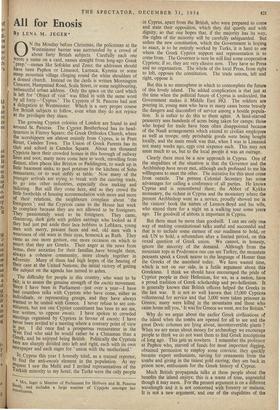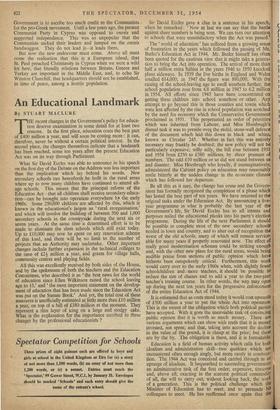All for Enosis
ay LENA M. JEGER* 0 N the Monday before Christmas, the policeman at the Westminster barrier was surrounded by a crowd of about forty British subjects. Carefully each one Wrote a name on a card, names straight from long-ago Greek prep.'—names like Sofokles and Zeno; the addresses should have been Paphos or Limassol, Larnaca, Kyrenia or some steep mountain village clinging round the white shoulders of a domed church. Instead on the dards is written Mornington Crescent, Hampstead Road, Scala Street, or some neighbouring, • unbeautiful urban address. Only the space on the card which Is left for 'Object of visit' was filled in with the same word by all forty—' Cyprus.' The Cypriots of St. Pancras had sent a delegation to Westminster. Which is a very proper course for British subjects to follow, even when they do not rejoice at the privileges they share.
The growing Cypriot colonies of London are found in and around St. Pancras. The C4priot Brotherhood has its head- quarters in Fitzroy Square; the Greek Orthodox Church, where the worshippers are almost entirely from Cyprus, is in Pratt Street, Camden Town. The Union of Greek Parents has its Club and school in Camden Square. About ten thousand Cypriots have their crowded homes in this borough of railway Imes and soot; many more come here to work, travelling from distant, alien places like Brixton or Paddington, to wash up in little basement sinks, to peel potatoes in the kitchens of Soho restaurants, or to wait deftly at table. Now many of the Younger arrivals are trying to break with the catering trade, to go into other industries, especially shoe making and tailoring. But still they come here, and as they crowd the little footholds of housing accommodation with more and more of their relations, the neighbours complain about 'the foreigners '; and the Cypriots came to the House last week to complain because they are not allowed to be foreigners. They passionately want to be foreigners. They came, Chattering, dark girls with golden earrings who looked as if they had just put aside their lace bobbins in Leftkara, young men with merry, peasant faces and sad, old men with a Weariness of old wars in their eyes, homesick as Ruth. They Came as one more gesture, one more occasion on which to assert that they are Greeks. Their anger at the news from home, their anxieties for their families have - brought them, always a cohesive community, more closely _together in adversity. Many of them had high hopes of the hearing of their case at the United Nations; the initial victory of getting the subject on the agenda has turned to ashes.
The difficulty for people in this country, who want to be fair, is to assess the genuine strength of the eno'sis movement. Since I have been in Parliament—just over a year—I have !lad countless talks with Cypriots who have come, either as Individuals, or representing groups, and they have always , Wanted to be united with Greece. I never refuse to see con- stituents, but not one Cypriot constituent has been to see me, nor written, -to oppose enosis. I have spoken to crowded Meetings organised by Cypriots in favour of enosis; I have !lever been invited to' a meeting where a contrary point of view La put. I did once find a prosperous restaurateur in the West End who said he would rather be a Chinaman than a °reek, and he enjoyed being British. Politically the Cypriots here are sharply divided into left and right, each with its own newspaper and each eager for ' union with the motherland.'
In._Cyprus this year I honestly tried, as a trained reporter, tO find the anti-enosis element in the population. At my Lequest I saw the Mufti and I invited representatives of the t'urkish minority to my hotel; the Turks were the only people Mrs. Jeger is Member of Parliament for Holborn and St. Pancras and includes a large number of Cyprjots amongst her constituents. • in Cyprus, apart from the British, who were prepared to come and state their opposition, which they did quietly and with dignity, so that one hopes that, if the majority has its way, the rights of the minority will be carefully safeguarded. But unless the new constitution, which the Government is hoping to enact, is to be entirely worked by Turks, it is hard to see where the Greek Cypriot support and representation is to come from. The Governor is sure he will find some cooperative Cypriots; if so, they are very elusive now. They have no Press and no organisation. The whole of the local Press, from right to left, opposes the constitution. The trade unions, left and right, oppose it.
But this is no atmosphere in which to contemplate the future of this lovely island. The added complication is that just at the time when the political future of Cyprus is undecided, the Government makes it Middle East HQ. The soldiers are pouring in, young men who have in many cases borne bravely the dangers and discomfort of service among a hostile popula- tion. It is unfair to do this to them aguin. A land-starved peasantry sees hundreds of acres being taken for camps; those who hoped for trade have been often disappointed because of the Naafi arrangements which extend to civilian employees as well as troops; only perishable goods were being bought locally, and the main result was that, when I was in Limassol not many weeks ago, eggs cost sixpence each. This may not seem much to us, but to the local people it was an outrage.
Clearly there must be a new approach in Cyprus. One of the stupidities of the situation is, that the Governor and the Archbishop have never met, although each professed to me his willingness to meet the other. The initiative for this must come from outside. The present Colonial Secretary has some advantages for calling a conference of all parties. He knows Cyprus and is remembered there; the Abbot of Kykko monastery, the richest in Cyprus and the monastery where the present Archbishop went as a novice, proudly showed me in the visitors' book the names of Lennox-Boyd and his wife, who stayed there for a night on a walking tour some years ago. The goodwill of abbots is important in Cyprus.
But there must be more than goodwill. I can see only one way of making constitutional talks useful and successful and that is to include some earnest of our readiness to hold, or ask UN to hold, a referendum after a limited period, on this vexed question of Greek union. We cannot, in honesty, ignore the sincerity of the demand. Although from the mountain tops at Prodromos one can see Turkey, the mountain peasants speak a Greek nearer to the language of Homer than the Greeks of the mainland today. We have wasted time, which is not on our side, in a futile argument about this Greekness. I think we should have encouraged the pride of Cypriot people in their Hellenism, for we, as a nation, have a proud tradition of Greek scholarship and pro-hellenism. It is generally known that British officers helped the Greeks in the last war. It is not so well known that 15,000 Cypriots volunteered for service and that 3,000 were taken prisoner in Greece; many were killed in the mountains and those who came home tell you, It was for Greece we went, not for Britain.'
Why do we argue about the earlier Greek civilisations of the island when the tombs are opened for all to see and the great Doric columns are lying about, incontrovertible giants ? When we are mean about money for archeology we encourage people to think we do not want them to find Greek inscriptions of long ago. This gets us nowhere. I remember the professor at Paphos who, starved of funds for most important digging, obtained permission to employ some convicts; they quickly became expert enthusiasts, sieving for ornaments from the tombs and giving in the tiniest gold earring; they are back in prison now, enthusiasts for the Greek history of Cyprus.
Much British propaganda talks at these people about the benefits the island enjoys; this is a waste of time, ungrateful though it may seem. For the present argument is on a different wavelength and it is not concerned with forestry or malaria. It is not a new argument, and one of the stupidities of the Government is to ascribe too much credit to the Communists - for the pro-Greek movement. Until a few years ago, the present Communist Party in Cyprus was opposed to• enosis and supported independence. This was so unpopular that the Communists sacked their leaders and jumped on the enosis bandwaggon. They do not lead it—it leads them.
But now the new endeavour must come. Above all must come the realisation that this is a European island, that St. Paul preached Christianity in Cyprus when we were a wild lot here, that friendly relations between Britain, Greece and Turkey are important in the Middle East, and, to echo Sir Winston Churchill, that headquarters should not be established, in time of peace, among a hostile population.



























 Previous page
Previous page